|
|
|
Sort Order |
|
|
|
Items / Page
|
|
|
|
|
|
|
| Srl | Item |
| 1 |
ID:
104580


|
|
|
| 2 |
ID:
183849
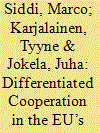

|
|
|
|
|
| Summary/Abstract |
European Union (EU) treaties have introduced legal frameworks for differentiated integration in European foreign and security policy, but they have rarely been used. Instead, member states have engaged in informal practices of differentiated cooperation. Based on an analysis of effectiveness, accountability and legitimacy of differentiated cooperation in the Western Balkans, the Middle East Peace Process, negotiations on Iran’s nuclear programme and the Ukraine crisis, we argue that differentiated cooperation has had positive outcomes when it has adhered to common EU values and positions. When this has not been the case, differentiation has undermined EU foreign and security policy.
|
|
|
|
|
|
|
|
|
|
|
|
|
|
|
|
| 3 |
ID:
164504
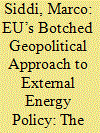

|
|
|
|
|
| Summary/Abstract |
This article argues that the European Union (EU) has pursued a geopolitical approach to its external energy policy in the Caspian region, with the aim of importing gas via routes that bypass Russia. This approach treats energy as a strategic good that governments need to secure through political, diplomatic and economic involvement in energy trade. The geopolitical approach differs from the traditional EU stance to energy policy, which focuses on market liberalization, competition, and climate targets. Through an analysis of key policy documents and statements of top EU officials in charge of external energy policy, the article shows that the Southern Gas Corridor (SGC) exemplifies a geopolitical approach to energy. In a second step, it highlights how the geopolitical logic that permeates the SGC has underplayed the important economic, technical and security challenges hindering the project. These challenges are compounded by Russia’s response, which aims at strengthening competition to SGC gas through new export pipelines (Turkish Stream). Finally, the article argues that, due to the multiple challenges faced by the geopolitical approach, the EU is more likely to achieve energy security through its traditional market liberal approach. As a large, integrated and well-regulated market, the EU can acquire sufficient and affordable energy resources by encouraging competition among external suppliers and by relying on the existing, underutilized import infrastructure. Furthermore, the implementation of the EU’s climate agenda makes long-term projects for the import of fossil fuels such as the SGC largely redundant.
|
|
|
|
|
|
|
|
|
|
|
|
|
|
|
|
| 4 |
ID:
144740
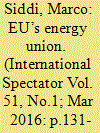

|
|
|
|
|
| Summary/Abstract |
The Ukraine crisis and subsequent tensions in relations with Russia urged the European Union to diversify its energy suppliers and integrate the energy markets of member states. However, the EU does not seem to have a clear strategy to strengthen its energy security. Member states are reluctant to relinquish control over their energy policy. Moreover, the diversification of fossil fuel suppliers may lead to new dependencies on authoritarian states, while the emphasis on unconventional energy sources may delay the development of renewables. A coordinated focus on renewable energy, coupled with investments in energy efficiency, appears to be the most forward-looking and climate-friendly way of reducing external dependencies.
|
|
|
|
|
|
|
|
|
|
|
|
|
|
|
|
| 5 |
ID:
152939
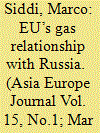

|
|
|
|
|
| Summary/Abstract |
This article analyses the current state of the gas relationship between the European Union (EU) and Russia and assesses its future prospects. It highlights that Russia has been an important supplier of gas to the European Union for more than four decades. However, the EU-Russia gas trade currently faces uncertainty over the regular transit of Russian gas via Ukraine, the construction of new pipelines and the implementation of EU legislation concerning the Union’s gas market. As the EU and Russia will remain interdependent in the gas sector at least for the next decade, it is in both sides’ interest to resolve these issues. The EU should both strengthen the security of its import routes for Russian gas and reduce the vulnerability of individual member states to supply shocks. Simultaneously, the EU would do well to increase the production of renewable energy and boost energy efficiency, which would reduce its dependence on external suppliers of fossil fuels.
|
|
|
|
|
|
|
|
|
|
|
|
|
|
|
|
| 6 |
ID:
189706
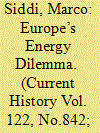

|
|
|
|
|
| Summary/Abstract |
An energy crisis has unfolded in the European Union since the autumn of 2021. The crisis has worsened due to Russia’s attack on Ukraine and climate change. The EU reacted by launching the REPowerEU agenda, which aims at cutting imports of Russian fossil fuels by diversifying trade partners, increasing energy efficiency, and accelerating the energy transition. But there are complications, especially European countries’ quest for new and more polluting fossil fuel supplies in the short run, which contradicts the EU’s green ambitions.
|
|
|
|
|
|
|
|
|
|
|
|
|
|
|
|
| 7 |
ID:
146329
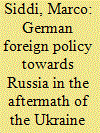

|
|
|
|
|
| Summary/Abstract |
This essay investigates the shift in Germany’s Ostpolitik approach to Russia as a result of the latter’s increasing domestic authoritarianism and assertive foreign policy, particularly its violations of international law in the Ukraine crisis. This prompted Germany to take the initiative in formulating EU sanctions against Russia. However, Germany has attempted to reconcile the sanctions policy with a diplomatic approach to resolving the Ukraine crisis by seeking ways of engaging Moscow on broader security and economic issues, as Russia is considered an essential factor in European and global security and a key energy supplier. Thus, Ostpolitik has not been abandoned altogether; it continues to play a role and shapes the long-term objectives of Germany’s Russia policy.
|
|
|
|
|
|
|
|
|
|
|
|
|
|
|
|
| 8 |
ID:
167239
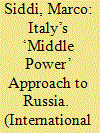

|
|
|
|
|
| Summary/Abstract |
After the Cold War, Italy developed an economic and political partnership with Russia. The confrontation between Russia and the West following the Ukraine crisis initially appeared to have undermined this partnership. Instead, despite reciprocal sanctions and tensions, Italian-Russian cooperation has proved resilient. Security and humanitarian crises in Italy’s Southern neighbourhood and Russia’s renewed activism there have recently led Italian policymakers to intensify dialogue with Moscow. The quest for dialogue with Russia corresponds to the long-standing conceptualisation of Italy as a ‘middle power’, which can achieve its foreign policy goals most effectively through cooperation with the great powers.
|
|
|
|
|
|
|
|
|
|
|
|
|
|
|
|
| 9 |
ID:
163414
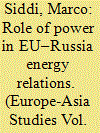

|
|
|
|
|
| Summary/Abstract |
Energy trade is an essential factor in EU–Russia relations. This essay argues that Russia and the European Union have deployed two types of power in their post-Cold War energy relationship. Russia has predominantly exerted geopolitical power through the sale of its vast energy resources and selected strategies to channel them to partners. With a large market but lacking fossil fuels, the EU attempted to achieve its aims mostly through regulatory power. However, both the Russian and the EU external energy policy strategies have recently become more nuanced. This evolution in their approaches has resulted in Russia’s gradual acceptance of the regulatory and market principles promoted by the EU.
|
|
|
|
|
|
|
|
|
|
|
|
|
|
|
|
|
|
|
|
|